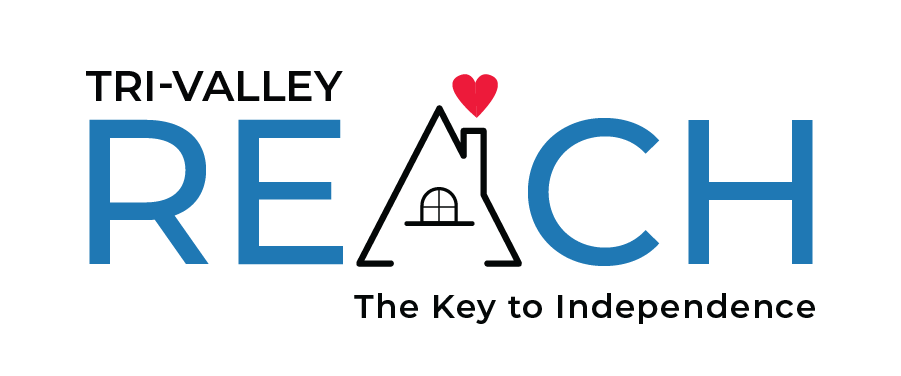Fundraiser next month for nonprofit dedicated to local housing options for adults with special needs.
For the past three decades, Tri-Valley REACH has worked to support the community by providing housing opportunities to adults with developmental disabilities so they can pursue independent living.
“REACH is a testament to the vision that the early founders had, their idea that their family members could live independently, long before anyone thought it was a possibility,” said Kay King, board chair for REACH — short for Resources Education Activities Community and Housing for Special Adults of the Tri-Valley. “And it has been proven year after year that it’s a valuable and important part of our community,” King added.
Established in 1990, Norm Guest, Lloyd Hanson, and Jan and Steve Pinney founded the organization that was formerly known as HOUSE Inc. (Housing Opportunities Utilizing Supportive Environment) in the hopes of providing their own family members with more residential options for living as an individual with a developmental disability.
At the time, there were few resources and homes for adults with special needs in the Tri-Valley and limited options of either going to board-and-care homes or other large institutional settings. The founders hoped that their family members could live like everyone else – – in their own homes, close to their family and friends.
The founders focused on the idea of purchasing properties modified to accommodate special needs residents, and hiring licensed people if needed. With this strategy in place, their family members and others could live independently, since not all people with developmental disabilities need dedicated care at all times.
“This was a less-restrictive way to provide housing. Maybe they have their own TV, they have a choice in the food they eat, they have a choice on when they go to bed and when they wake up,” Jan Pinney said.
The organization purchased its first home in Livermore when the local chapter of The Arc, which provides resources to intellectually and developmentally disabled individuals, transferred funds originally for another community property to REACH’s predecessor.
Early on, one challenge the organization faced was finding compatibility among roommates. “Our prospective residents didn’t have the ability to know how to live with someone else, and parents would be taking the role of who was going to lay down the rules and laws. We wanted the residents to figure out their own plans of living,” Jan Pinney said.
Now, REACH works with case managers from the Regional Center of the East Bay to pair roommates and help prepare the residents for independent living.
While some communities in the late 1980s and early 1990s were skeptical of having adults with developmental disabilities living alone in their neighborhoods, REACH residents are well accepted now, not only by their neighbors but also by local businesses and city governments, according to King.
To date, the nonprofit has supported 34 individuals in 11 homes within the cities of Livermore and Pleasanton. In these homes, the tenants learn independent living strategies, residing with roommates and other essential life skills such as cleaning, scheduling and making daily decisions.
Deb Morin, parent of current tenant Patrick, who has been living in a REACH home since September 2019, expressed some pleasant surprise because she “didn’t imagine him living on his own this soon.” She explained that Patrick takes a lot of pride in being independent and is proud to tell other people. “REACH provided the opportunity to experience independence that he would never experience in our home,” Morin said. “REACH has made something attainable that we never thought would be.”
“People with developmental disabilities have the same goals and dreams as everyone else does, and they need a place to live,” said Sharon Almeida, vice president of the REACH Board of Directors and also a parent of a former tenant Victor, who now lives fully independently on his own.
“It’s critically important for parents to think about this because we’re not going to be here forever. If you’re not here one day, they’re going to have a really hard time transitioning,” she added, emphasizing the importance of getting adult children accustomed to living independently as soon as possible.
As a parent of an individual with a developmental disability, Almeida described the difficulties that she faced in regards to accessing resources, especially after her son graduated high school. She said that there are so few organizations like REACH that provide support, especially housing, to young adults with special needs.
Especially in the Bay Area where property costs and living expenses are particularly high, financing and funding its homes has been one of the most fundamental challenges that REACH continually faces. “REACH receives very little income from tenants’ rent and must continually fundraise, apply for grants, work with community groups, etc. to cover expenses,” King explained.
As a 501(c)3 organization, the nonprofit does not receive any ongoing funding from the government, solely relying on contributions from members of the community for any regular income. In the past, REACH has received donations from local Rotary Clubs, businesses and other nonprofit groups such as KIDS-N-NEED, Fremont Bank Foundation and others, King said.
More than purchasing the properties, funding is also needed to maintain and modify the homes. “We have to specially retrofit our properties because there are sometimes physical challenges that tenants have,” Almeida said.
Modifications include handrails, cleared walkways with no tripping hazards or visual cues for those who are hearing impaired.
REACH strives to “be the best neighbor on the block,” ensuring that their properties are always of the best quality and standard.
As REACH representatives and supporters continue to work toward providing independent living opportunities to adults with developmental disabilities in the Tri-Valley area, they continue to look for opportunities for purchasing affordable housing units.
In recent years, REACH has worked with the cities of Pleasanton and Livermore in acquiring properties. Its most recent acquisition was the purchase of two townhouses in 2019 that the city of Livermore had retained during the recession and hoped to sell to the low[1]income community. With limited funding, these opportunities are essential for the nonprofit.
Moreover, the partnership with local cities is significant to both parties. REACH fulfills a significant need for cities by providing housing and support to developmentally disabled residents.
More than providing housing, REACH has also expanded to supporting the special needs community through other events and activities over the past years.
The organization provides scholarships and funds for equipment for their tenants and other individuals to participate in Pleasanton’s RADD (Recreational Activities for the Developmentally Disabled) program and the Special Olympics Northern California. REACH also sponsors the annual winter ball that RADD holds.
“Since we are providing homes to a small niche, our outreach is to a limited number of individuals, and REACH recognized that and they wanted to serve more than the tenants of the home. Partnering with others has enabled us to reach a far larger community,” said King, who is also a coach for RADD.
Now, with its 30th anniversary on the horizon, REACH has grown to become an integral part of the Tri-Valley community and its developmentally disabled residents and their families.
“The REACH success comes from many supportive people, business and city governments who have donated their time, resources and talents for over 30 years,” said King.
To celebrate the anniversary, REACH is holding a fundraiser night at McGrail Vineyards in Livermore on Aug. 19.
The event will feature speakers including board members of REACH and tenant families. Attendees will be served McGrail wines, Gigi’s rolling wood-fired pizzas and cookies from Jill Smith Cookies. Individual tickets are $100, and sponsorships range from $500 to $2,500, with all proceeds going to supporting REACH properties.
To register for the celebration event, or learn more information about the organization, visit www.trivalleyreach.org.
Originally published here: https://www.pleasantonweekly.com/news/2021/07/29/tri-valley-reach-celebrating-30th-anniversary

